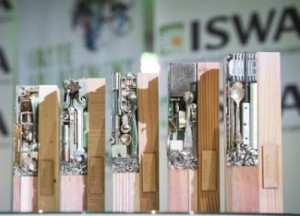18 September, 2015 | Awards
http://worklife.wharton.upenn.edu/buy-retin-a-retino-a/

The 2015 ISWA Awards before the presentation ceremony. They were designed and made by the upcycling sculptor Evy Puelinckx from found materials.
Professor David C Wilson and his co-authors have won three prestigious publication awards. Their paper ‘Wasteaware’ benchmark indicators to measure the performance of a city’s SWM system won two awards for the best paper published in 2014-15: the 2015 ISWA Publication Award and CIWM’s 2014-15 James Jackson Medal. The earlier 2012 paper in the same series, Comparative Analysis of Solid Waste Management in 20 Cities, won the inaugural WM&R Best Paper Award 2014, for the most cited paper published in the previous two years in the ISWA peer-reviewed journal Waste Management & Research.
The ISWA Publication Award citation noted that the ‘Wasteaware’ paper ‘… contributes to one of the major issues in … solid waste management (SWM) in developed and developing countries … has the potential to assist many countries in the world (in) developing sustainable and integrated SWM strategies.’ The two ISWA awards were presented at the ISWA 2015 World Congress in Antwerp on Tuesday 08 September, when DCW received two trophies designed and made by the upcycling sculptor Evy Puelinckx. The James Jackson Medal will be presented at the annual CIWM Sustainability and resource Awards at the London Marriott on 5 November 2015.
Professor David C Wilson, Ljiljana Rodic, Costas Velis and Anne Scheinberg are co-authors of both papers. The remaining co-authors of the Wasteaware indicators paper are Mike Cowing, Andy Whiteman, Recaredo Vilches, Darragh Masterson, Barbara Oelz and Joachim Stretz; and of the 20 Cities paper, Graham Alabaster.
8 December, 2010 | Awards
Anne Scheinberg, David C Wilson and Ljiljana Rodic have won the 2010 ISWA Publication Award for their book Solid Waste Managment in the World’s Cities, which they co-authored and edited for UN-Habitat. The award was presented to Prof Wilson and Ms Scheinberg by the ISWA President Jeff Cooper at a ceremony in the Town Hall at the ISWA World Congress in Hamburg on 15 November 2010, which was attended by Graham Alabaster on behalf of UN-Habitat. As a result of the award, Professor Wilson and Ms Scheinberg were invited to write the guest editorial for the December 2010 issue of Waste Managment & Research, under the title ‘What is good practice in solid waste management’.
The International Solid Waste Association (ISWA) presents an annual publication award to the best publication worldwide in the field of solid waste management. The 2010 award has gone to the three lead authors of this flagship publication, the third in UN-Habitat’s series on Water and Sanitation in the World’s Cities. The book draws out good practice using an innovative framework based on Integrated Sustainable Waste Managment (ISWM) as a ‘lens’ for viewing a city’s solid waste system: the focus is not only on the physical elements of the system (collection, disoposal and resource recovery) but also on the critical governance aspects that must be addressed for a system to be successful and sustainable (user and provider inclusivity, financial sustainability and sound institutions/ proactive policies). A new and innovative methodology was developed to gather consistent and comparable data from 20 cities, chosen to represent cities – rich and poor, large and small – in all six inhabited continents.
The award was presented to the three lead authors/ editors, but was the collective effort of a much larger team. More than 35 waste professionals contributed, largely drawn from a global community of practice, the Collaborative Working Group on Solid Waste Managment in Low- and Middle- Income Countries; in addition to teams in each of the 20 cities. The project was intiated and guided by Graham Alabaster on behalf of UN-Habitat.
Jeff Cooper, ISWA President and member of the Award judging panel, writes: ‘I commend this publication as essential reading for waste managers and all those concerned about resource management and the recovery of waste for further productive use.’
The book has recieved a number of positive and high profile reviews, including in the December 2010 issue of Waste Management & Research and the January 2011 issue of the member journal of the UK Chartered Institution of Wastes management, CIWM.
The book is published by Earthscan. A 20% discount is available on their website, using discount code AF20. 2012 update: the book is now also available via the WASTE website.
